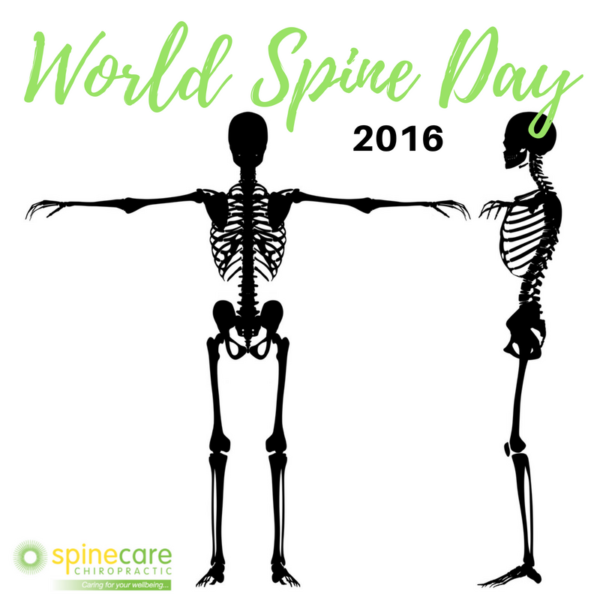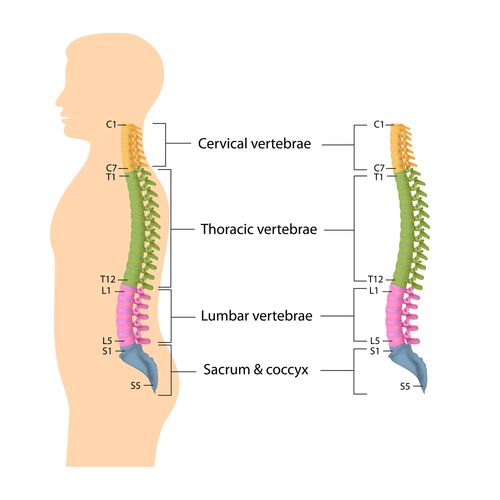Your spine – explained! {World Spine Day 2016}

Put a party hat on your back!
October the 16th is World Spine Day! An International day to raise awareness of spinal disorders, spinal wellbeing and the value of a holistic, collaborative approach to spine care.
Today, we’re putting our spin on chiropractic terminology to get you familiar with the magic of your spine!
Your spine – explained
Human anatomy can seem like a confusing soup of jargon and scientific terms.
But we LOVE talking to you about your body, and how to understand it.
That’s why – to celebrate World Spine Day on October the 16th – we’re putting our spin on spinal terminology to get you curious, involved and familiar with the magic of your spine.
It’s more than just a bendy bit of licorice in your back – it’s truly incredible.
Get to know your spine
Ever felt confused after being told ‘There’s a problem with your L2’ or ‘You’ve got cervical disc issues’? What do these letters mean? And doesn’t cervical refer to something different entirely?
It’s understandable to feel out of the loop. These terms are second nature to health professionals, but largely unfamiliar to the general population.
But we want to change that – because education and celebration is what we’re all about.
To honour World Spine Day, let’s take a look at the different regions of your spine, what they do and how to understand them.
(And this anatomy lesson won’t send you to sleep – promise!)
What’s the purpose of the spine?
The spine has three main functions:
- To house and protect the spinal cord.
- To provide structure, support and balance for the rest of the body.
- To offer flexibility and dynamic movement.
- (BONUS!) Your spine allows you to do ‘the worm’ on the dance floor.
The spinal alphabet: C, T, L & S

Spinal Anatomy
Let’s start at the skull. Though not part of the spine per se, it’s important to acknowledge its key role in balance and brain protection – and that’s pretty important for the average bear. It’s supported by…
C – The Cervical spine
You’ll sometimes hear us referring to C1, C2, C3, etc. during treatment. We’re identifying the individual spinal vertebrae, starting at C1 – the Atlas (which supports the skull) down to C7 (which connects to the Thoracic Spine – coming up next).
Your cervical spine supports the head, neck and a wide range of human movements – and is really rather delicate. It cops a lot of pressure from bowling-ball heads constantly looking DOWN at mobile phones. Next time you text, spare a thought for your stressed cervical spine!
T – The Thoracic Spine
Think of your Thoracic spine as your upper back and rib zone.
There are 12 vertebra, starting with T1 – the smallest, following on from the cervical spine – down to T12 – the largest, leading onto the lumbar spine.
The Thoracic spine stabilizes your rib cage and protects many vital organs – therefore has less movement than the upper cervical spine and the lower lumbar. It’s strong, solid and has a limited range of motion.
L – The Lumbar Spine
The Lumbar Spine is curved like a backwards C, is able to flex (but not easily rotate) and has large, trusty vertebrae. It has to carry most of the body’s weight, after all.
There are 5 vertebra – L1 to L5 – the last of which attaches to the sacrum; part of the pelvis.
S – The Sacral Spine
This part of your spine is located behind your pelvis. It’s actually a triangular-shaped bone with 5 parts, fused together.
Identified individually as S1 – S5, these bits fit neatly between your hip bones and join to your tail! Well, what remains of it. The coccyx.
The coccyx, or tailbone, signals the end of the spinal column and today’s lesson.
But there’s always more to learn, and we don’t need to tell you that your spine is a beautiful, complex and vital part of your person. Be sure to protect it!

